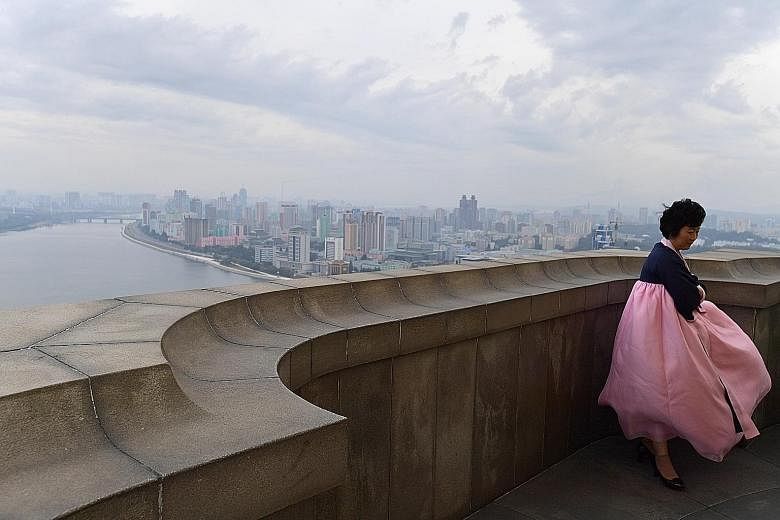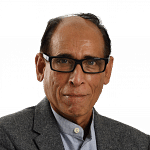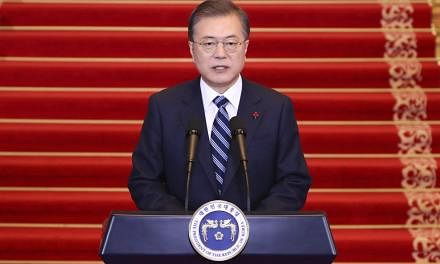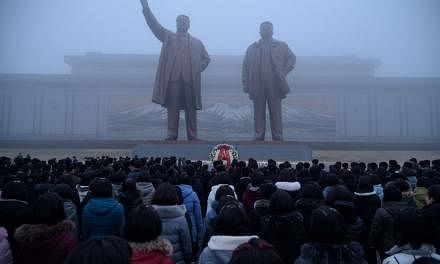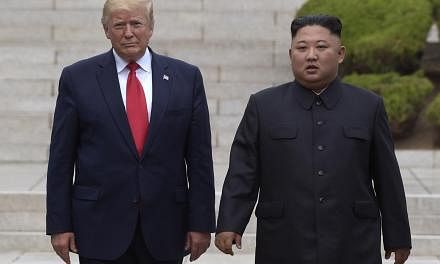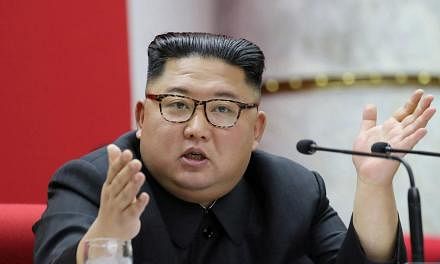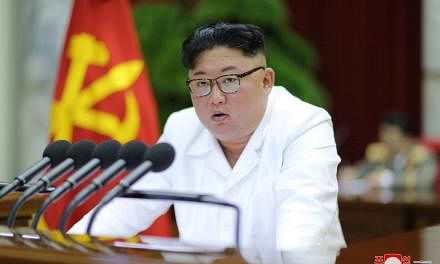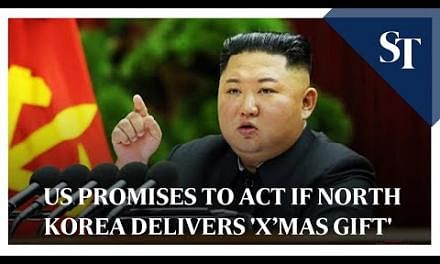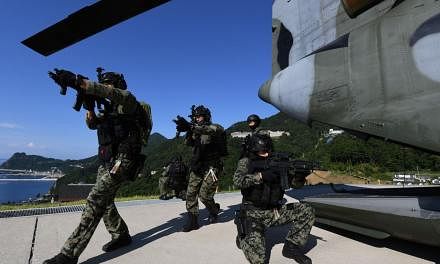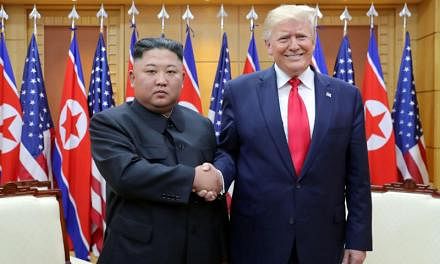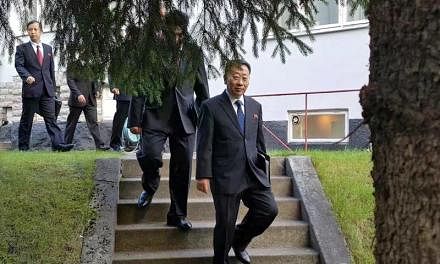At the inter-Korea summit on April 27, South Korean President Moon Jae In presented North Korean leader Kim Jong Un with something unusual: a USB thumb drive.
According to the South Korean authorities, it contained a presentation of details of various infrastructure projects involving the two Koreas - together with other economic cooperation measures - that could be pursued once the international sanctions against North Korea are lifted.
Among them were plans for power projects as well as a railway line between the two Koreas linking the capitals and then going through China's north-east, all the way to Europe.
The presentation also included three "economic belts" - one along the west coast of the Korean peninsula to the Chinese border, another along the east coast, connecting to Russia, and a third straddling the demilitarised zone that marks the border between North and South Korea.
Mr Moon was capitalising on a major development that had taken place in Pyongyang just a week earlier.
On April 21, Mr Kim had announced at a meeting of the ruling Workers' Party central committee that he would be ending the policy of byungjin, or the "parallel advance" of North Korea's nuclear programme and its economic reforms, which had been in place since March 2013.
The nuclear programme had been a success, he proclaimed - North Korea had built a credible deterrent against its enemies. So now it was time to adopt a "new strategic line" and concentrate on rebuilding North Korea's economy.
Economic reform has therefore become Mr Kim's top priority. Relief and assistance for North Korea's beleaguered economy will be the ultimate prize he will be seeking in his summit with United States President Donald Trump in Singapore on June 12, although what concessions he will make to achieve that goal - and what Mr Trump will offer - remain to be seen.
BLACK BOX
The North Korean economy is something of a black box. The regime puts out hardly any data, so economists rely on proxy variables and accounts from well-informed defectors to piece together a picture of what is really going on.
From what we know, Mr Kim's regime has been reasonably pragmatic in its approach to economic management. While Soviet-style central planning remains the official credo, in practice, a thriving private informal sector also exists and has been tolerated and even encouraged.
A rare study of North Korea's informal economy in October 2015 by Dr Kim Suk Jin and Dr Yang Moon Soo of the Korea Institute for National Unification in Seoul points out that, as in many developing countries, the share of the informal sector in North Korea's economy is "quite high... and growing, rather than stagnating". It spans many activities, including agriculture, services, fishing, mining and even manufacturing.
For example, farmers produce food to sell in private markets - which has been happening since the famine of the 1990s and has helped stem food shortages.
Truckers, even those affiliated to state companies, provide transport services privately for a fee.
State trading companies use private traders to supply imported goods to the domestic market.
Private entrepreneurs run restaurants, retail businesses, markets and informal banking operations, such as moneylending.
The use of mobile phones has boosted the informal economy - buyers and sellers are able to contract over the phone and respond quickly to market conditions.
While gross national product numbers are not officially released, South Korea's central bank, the Bank of Korea, estimates that North Korea's GDP grew by 1.2 per cent on average from 2012 to 2016 - although last year's performance is likely to have been weaker because of the imposition of UN sanctions.
The CIA World Factbook estimates North Korea's per capita GDP at US$1,700 (S$2,270) in purchasing power parity terms in 2015, and ranks it 214th in the world out of 228, just below Haiti - which would make it a low-income developing country.
A TALE OF TWO ECONOMIES
But North Korea has two economies which operate in parallel. There is the "people's economy", which is divided into the state and non-state sectors, and there is a "royal court economy", which is used by the regime to dispense patronage.
This is revealed in several accounts by analysts and defectors - some of whom have worked in the royal court economy - and vividly captured in the eye-opening 2017 television documentary Money And Power In North Korea: The Hidden Economy, by Japan's NHK.
As part of its efforts to build support and retain power, the regime practises "gift politics". People are regularly gifted assets, which can range from apartments and luxury cars for high government and military officials to consumer goods such as TV sets for ordinary citizens.
The royal court economy is separate from the people's economy - it has its own budget and sources of revenue, which include income from farms, industries and mines, as well as weapons deals, casinos and even the export of giant bronze statues, the making of which North Korean craftsmen excel.
Some observers estimate that the royal court economy accounts for more than half of all economic activity.
However, in the face of economic sanctions against North Korea, which were tightened last year, the royal court economy is shrinking.
Gift politics, which is critical for the regime's perceived legitimacy and survival, is under threat.
THE BITE OF SANCTIONS
North Korea has endured economic sanctions for much of its history, and successive regimes have been wily and resourceful in finding ways to circumvent them. But the latest round of sanctions have more bite than those imposed earlier.
Since September last year, the United Nations Security Council has banned all of North Korea's main exports, including coal, iron ore, copper, zinc, garments and seafood. Workers' remittances have all but dried up as the sanctions also place limits on the employment of North Korean workers by other countries.
About 90 per cent of the country's foreign currency earnings are potentially hit. North Korean banks and shipping companies have been blacklisted as well, which threatens financial transactions and smuggling. The sanctions even prohibit Mr Kim from paying for his hotel stay in Singapore during the summit meeting with Mr Trump.
Moreover, in contrast with previous rounds of sanctions, China, which accounts for more than 90 per cent of North Korea's trade, has also tightened the screws on Pyongyang, slashing exports of fuel to almost zero since October, cutting back on imports, announcing it will close business joint ventures with North Korea and sending North Korean workers home.
Anecdotal reports from North Korea point to factory closures, massive job losses and skyrocketing prices of scarce imports - as well as a glut of seafood, which cannot be exported.
North Korea has set up a Sanctions Damage Investigation Committee. On Sept 29, the country's official news agency said: "The colossal amount of damage caused by these sanctions to the development of our state and the people's livelihood is beyond anyone's calculation."
That is probably even truer today. The sanctions, if continued, threaten to plunge the North Korean economy into a serious crisis - perhaps as early as next year. Equally importantly, and ominously, they also threaten the existence of the royal court economy, the regime's financial lifeline.
So for Mr Kim, financial relief and assistance as soon as possible are critical for the survival of North Korea's economy - and perhaps even his regime.
The US has said that it does not seek "regime change". But Mr Trump is likely to drive a hard bargain on the nuclear issue at the Singapore summit, perhaps setting an aggressive timetable for disarmament and tough, intrusive conditions for verification.
Mr Kim has the weaker hand - the nuclear deterrent is his only ace - but he still has some cards to play. In fact, North Korea's crippled economy, while a source of weakness, is also a bargaining chip.
Neither the US nor China, South Korea or Japan would want to see a collapse of North Korea's economy, which would potentially create a refugee crisis, more problems for China's north-eastern provinces and new geopolitical uncertainty arising from a desperate, nuclear-armed regime with nothing to lose.
Nor would Mr Trump want to see a failed summit, for which he would be held at least partly responsible.
NEW POSSIBILITIES
On the other hand, if North Korea and the US do manage to find common ground, even without a definitive agreement, this could gradually open up rich new possibilities for Pyongyang: the easing of sanctions, the resumption of foreign aid and eventual accession to international financial and economic institutions like the International Monetary Fund, the World Bank, the Asian Development Bank and the World Trade Organisation, which would pave the way for the systemic reform of North Korea's economy and its emergence from isolation.
Mr Kim could transform himself from global menace to economic reformer.
As North Korea opens for business, other countries would benefit too. Infrastructure providers from South Korea, China, Japan and the US, among others, would stand to win contracts.
South Korea's Hyundai group, whose founder was born in North Korea, is already readying itself to resume doing business there. Broking firms in Seoul and Tokyo have started identifying "North Korea-sensitive stocks". In anticipation of a positive outcome at the Singapore summit, the stock price of Hyundai Engineering and Construction rose 75 per cent between April 17 and June 5.
China's relatively poor north-eastern provinces, parts of which are already informally integrated economically with North Korea, would stand to benefit from its opening.
Foreign investment, which has been virtually non-existent, would begin to flow into North Korea. South Korean companies could shift some of their operations to the North to benefit from low-cost labour. A creeping process of economic unification of the two Koreas could begin - although political unification is another story.
But such rosy scenarios are distant and uncertain. There is still a lot of hard negotiation to get through. The Singapore summit is only the start.
